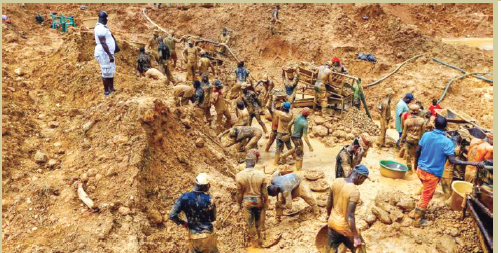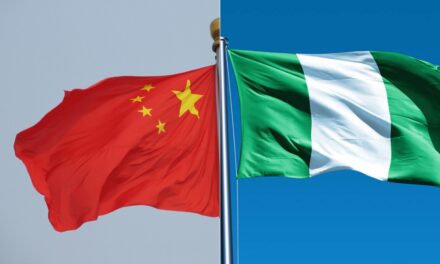Nigeria is inching closer to becoming Africa’s mining investment hub. By dangling the proverbial carrot in the form of regulatory incentives as well as tax and other fiscal reliefs to prospective local and foreign investors, the Federal Government, through the Ministry of Mines and Steel Development, may have opened the floodgate of investments into the mining sector. The ministry has also addressed most of the operational and legal hurdles to boosting investors’ confidence. The various mouth-watering incentives to woo investors may have raised hopes of leveraging mining to dislodge oil as Nigeria’s major revenue earner. Assistant Editor CHIKODI OKEREOCHA reports
Nigeria has never been this close to achieving her quest to become the investment destination of choice for mining in Africa. Already, various pragmatic and strategic initiatives put in place by the Federal Government, through the Ministry of Mines and Steel Development, to woo prospective local and foreign investors into the mining sector may have started yielding fruits.
For instance, The Nation learnt that on the strength of various irresistible incentives dangled to investors, the ministry is currently being inundated with investment enquiries, indicating the growing confidence of investors in the sector. The development, which gladdened the hearts of industry regulators and stakeholders, may have reinforced hopes of turning Nigeria into a mining destination of choice.
The Director-General (DG), Mining Cadastre Office (MCO), Engr. Obadiah Simon Nkom, personified the renewed hope of leveraging on the initiatives so far put in place to de-risk the sector and make it investment-friendly to make Nigeria Africa’s mining and metal investment hub. “Nigeria is ready for foreign investors. We have good regulations in the sector that will protect their investments,” he declared.
An obviously excited Nkom added that with the necessary political will already in place, a transparent licensing regime, and a geological data, Nigeria’s mining sector has never been this attractive to investors. For instance, the operations of MCO, which he heads, has been automated and upgraded to enable interested mineral title applicants access their services online.
The Investment Promotion and Mineral Trade Department has also been strengthened to provide information on investment opportunities in the industry as well as areas of linkages in the downstream segment of the mining industry.
Also encouraged by a result-driven synergy amongst agencies in the ministry, the MCO, The Nation learnt, has also streamlined its licensing regime. This was to enable credible investors interested in mining to apply and obtain licenses and leases within and outside Nigeria.
The overall aim was to improve the effectiveness and efficiency of the office, promote transparency in mineral title administration, and reduce the burden on the investors.
The current synergy amongst agencies in the ministry has also seen the Nigerian Geological Survey Agency (NGSA) undertaking the National Integrated Mineral Exploration Project in order to provide credible geosciences data for potential investors in the industry.
NGSA is the custodian of Nigeria’s geosciences information. A parastatal under the Ministry of Mines and Steel Development, the NGSA, established by an Act of the National Assembly on May 22, 2006, has the statutory role of providing relevant and up-to-date geosciences information necessary for economic development of Nigeria.
The Minister of Mines and Steel Development, Mr. Olamilekan Adegbite, has since turned his attention to strengthening the NGSA to deliver on his promises of turning around the fortunes of the mining sector. He believes that effective mining is based largely on good quality geological and mineral information systems.
Consequently, Adegbite, as part of his carefully articulated strategies to woo investors and position mining as Nigeria’s next oil, has dangled the proverbial carrot to investors by way of building a strong geosciences base.
It was the minister’s idea of enhancing Nigeria’s competitiveness as a world class mineral exploration destination capable of attracting serious private sector investments.
This was why he said the Natural Resources Development Fund (NRDF) is being invested into the National Integrated Mineral Exploration Project (NIMEP) to provide credible geosciences data for potential investors in the industry.
Adegbite admitted that NIMEP was one of the ministry’s proud achievements. Giving more details, he explained: “The Federal Government awarded a contract sometime last year after the approval of the Federal Executive Council.
“The project involves about N14 billion ($45 million) and it is to be undertaken nationwide and will involve the exploration of base metals, rare earth metals and industrial metals like Lead, Zinc, Barite, and Iron Ore. And preliminary result indicates significant success in the project.
“The result is to provide a commercially viable data that can be accessed by foreign investors in order to contribute meaningfully to wealth creation, employment generation and contribute meaningfully to the national Gross Domestic Product (GDP).”
Adegbite, who has drawn sufficient strength from what the ministry, under his charge, has so far put in place to open a floodgate of investment into the mining sector, is already looking into the sector’s future with so much hope and optimism.
“In 2020, the result of NIMEP is going to be released and I look forward to that as the result would further unlock the investment potential of the sector.
“This would allow government to dissect the areas into blocks and undertake internationally competitive bidding process in order to commence serious mining activities in the country,” he told The Nation, last week.
He also said the ministry intends to help the artisanal and small-scale miners to access funds, strengthen the Investment Promotion and Mineral Trade Department to undertake its function and properly fund the Surveillance Task Force of Mines Inspectorate to curb illicit trading in mineral commodities.
The Permanent Secretary, Ministry of Mines and Steel Development, Dr. Abdulkadir Muazu, is no less excited by the mining sector’s prospects of bouncing back on the back of initiatives put in place to make it investment friendly.
He said, for instance, that one of the major steps that have made the sector investor friendly was the enactment of mining laws with specific provision for fiscal incentives that are enshrined in the law such as tax incentives, waiver for import of machineries that are related to mining.
“The second key initiative of the agency was through the MCO, where the ministry reformed the licensing process to make sure it is transparent and fair. The MCO also introduced the principle of ‘first-come-first-served and security of tenure,” Muazu said, adding that the ministry has also enhanced its organisational and regulatory capacity.
Tax, other fiscal incentives to the rescue
To demonstrate its resolve to create an enabling environment for investors to come into the mining sector, the Federal Government, through the Ministry of Mines and Steel Development, rolled out a number of fiscal and investment incentives to woo prospective local and foreign investors.
Some of the strategic incentives and reforms that may have started changing the foreign investors’ perception of the mining sector include tax exemptions, duty drawbacks, subsidies, export expansion grants, double taxation reliefs, investment promotion and protection agreements, tax holidays, tax credits, and capital allowances, among others.
For instance, one of the incentives provided under the various relevant laws and regulations, was the mouth-watering offer of a three-to-five-year “tax holiday.”
By the combined provisions of section 36 of the Companies Income Tax Act and section 28 of the Mining Act, a tax relief period of three years and a further extension of up to two years can be granted to companies engaged in mining operations
Also, by the provision of section 25 of the Mining Act, operators in the mining sector are granted exemption from payment of custom/import duties in respect of plants and machineries imported specifically and exclusively for mining operations.
The Mining Act also gives allowance to a mining company to set up a tax deductible reserve for environmental protection, mine rehabilitation, reclamation and mine closure costs.
Mining companies also enjoy an accelerated capital allowance of 95 per cent on qualifying capital expenditure incurred in the year in which the investment is made.
There is also incentive in the form of loss relief such that losses can be relieved for a maximum period of four years after which all un-relieved losses are allowed to lapse.
Similarly, where a holder of a mineral title earns foreign exchange from the sale of its solid minerals, it may be permitted by the Central Bank of Nigeria (CBN) to retain a portion of same for use in acquiring spare parts and other inputs required for mining operations which otherwise would not be readily available without the utilisation of such earnings.
Also, mining companies may benefit from waiver of applicable royalties, even as there is the assurance that corporate income tax in the mining sector will range between 20 and 30 per cent, which, according to industry experts, is quite competitive in the international market.
A number of legislations also provide for other forms of irresistible benefits, particularly to foreign investors, in that they protect their investments from expropriation.
For instance, foreign investors, most of who have been holding back for fear of having their lawful and legitimate enterprises nationalised, can now heave a sigh of relief. Their investments will no longer be taken away from them.
Why the incentives, reforms became imperative
The mining sector is widely acknowledged as potentially hugely rewarding. However, investing in mining is no tea party; it is not a business for faint-hearted investors, local or foreign. As Adegbite admitted, “Mining is not only capital intensive, but also has a long gestation period.
Partner/Mining Industry Leader, PwC Nigeria, Mr. Cyril Azobu, put the situation in perspective when he told The Nation that mining is not a sector that one expects that something will happen quickly. According to him, the typical life cycle in any mining is long; the gestation period is also long.
Listen to the mining expert: “Take, for example, the entire value chain – from exploration down to processing – the exploration, which is the riskiest part of it – takes quite a long time. It takes a long time to do exploration…One; you are not going to have people who will invest in exploration as a result of the level of uncertainties.
“Two, you don’t know how much you are going to get. So, to do that, you need time, sometimes between three and five years or even more, to do exploration. When you do exploration, you have to begin to develop that area, construct, build plants to carry out operations there, you move to some level of processing.
“Even when you are exporting, you need to have some degree of processing, and have your export channels. But even at that, because you are exporting, that is still subject to global commodity pricing, which is only just improving at the global level.”
As if the long gestation period before returns can be generated from mining operations is not enough to deter investors, inadequate funding added to prospective investors’ woes. This is so particularly for Nigeria, where most mines are typically green fields, making them unattractive for funding by traditional commercial banks.
Indeed, the development of the mining sector, over the decades, has been stunted by inadequate funding to cater to the different stages of the life cycle of a typical mining operation.
Before returns can be generated from mining, the relevant operations need to go through five stages namely, exploration, development, mining, processing and marketing. And the cycle takes averagely between two to 10 years or more.
These are some of the realities that are believed to have prompted the ministry, with Adegbite as the arrowhead, to roll out initiatives targeted at making mining attractive to would- be investors with the requisite financial and technical muscle to come into the sector.
The minister has also moved to ensure that intervention funds made available for the sector by the Federal Government, through the Bank of Industry (BoI), as well as the technical assistance funds provided by the World Bank are accessible to miners, at repayment terms that are reflective of the realities in the mining industry.
Giving more insight into the increased focus on making mining attractive to investors, Adegbite said the mining sector had actually been in a very bad shape all these decades, stemming from the neglect the sector went through as a result of oil boom.
He said because of this, the big expatriate mining companies left the country and the sector went into doldrums. However, with the advent of the Nigerian Mineral and Mining Act 2007 and the Nigerian Mineral and Mining Regulations 2011, the country launched itself once again as a mining destination.
As part of the re-launch of Nigeria as a mining destination, Adegbite said the ministry has not only formalised artisanal miners, but has gone a notch higher by committing to helping artisanal and small-scale miners to access funds.
Over 1,500 Mining Cooperatives have also been registered nationwide, just as about 250 Private Mineral Buying Centres have been registered to facilitate trading in mineral commodities.
Also, to ensure environmental mitigation in the mines field, the minister said Environmental Laws and Regulations are being enforced to the letter.
According to him, Nigeria, last year, organised the 2nd International Conference on Artisanal Gold Mining with Lead alongside with Medicines San Frontiers (MSF). The forum provided strategies to prevent lead poisoning associated with artisanal gold mining.
Targeting increased mining contribution to GDP
Globally, most countries of the world, irrespective of their stages of development, now dangle a variety of financial, fiscal, and regulatory incentives to prospective investors in order to achieve their economic development goals.
For Nigeria, this has become necessary particularly in the mining sector, where the need to significantly boost the sector’s contribution to the nation’s Gross Domestic Product (GDP) has become compelling in view of the fall in oil prices at the international market.
At present, mining contributes only 0.3 per cent to GDP. Although, the sector’s contribution to GDP increased to about five per cent in 2015, the figure is considered meagre for a mineral endowed nation like Nigeria.
The Roadmap for the Growth & Development of the Nigerian Mining Industry of 2016, however, projected the potential for increase in the sector’s contribution to GDP to 10 per cent by 2020. The hope was that this will help position mining as Nigeria’s next oil.
Infrastructure still a sore point
Promising as some of these mouth-watering incentives to woo investors are, there are fears that poor infrastructure may throw spanner in the works, if the Federal Government fails to double efforts to close the nation’s infrastructure gap particularly in the areas of electricity and road/rail networks.
Although, the current administration has prioritised the improvement of the ease of doing business and the removal of barriers to investment, industry operators and experts say that government should address the issue of supportive infrastructure particularly steady electricity supply.
They also noted that a well-developed mining industry thrives on well-established transportation network (road/rail), which supports the movement of equipment to mining sites and the evacuation of minerals for sale and export.
More importantly perhaps, there is need for the Federal Government, through the ministry, to walk the talk in ensuring consistency and sanctity of laws and policies. The thinking, and rightly so, is that mining policies should guarantee predictability and consistency of application of rules.










